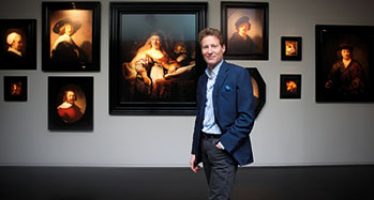Alisher Usmanov: A Likeable Oligarch
 Billionaire Alisher Usmanov is a Russian oligarch with a twist. Mostly known for his thirty percent stake in Arsenal FC, Mr Usmanov is also famous for the in-your-face style with which he habitually displays his vast personal wealth.
Billionaire Alisher Usmanov is a Russian oligarch with a twist. Mostly known for his thirty percent stake in Arsenal FC, Mr Usmanov is also famous for the in-your-face style with which he habitually displays his vast personal wealth.
Flying about in his custom-fitted Airbus 340 wide-body jet and maintaining a few pricey properties in London, does not necessarily make Mr Usmanov a figurehead of frugality. However, this perhaps archetypical representative of Russian nouveau riche also has a few powerful, and surprising, tricks up his sleeve which possibly constitute redeeming qualities.
In December 2014, Mr Usmanov paid $4.8 million (£3.18m) at an auction in New York City for the Nobel Prize Medal awarded to US molecular biologist James Watson for his research on the structure of nucleic acids. This work later led to the discovery of the double helix structure of DNA. Dr Watson shared the 1962 Nobel Prize for Physiology or Medicine with fellow researchers Francis Crick and Maurice Wilkins.
“In December 2014, Mr Usmanov paid $4.8 million (£3.18m) at an auction in New York City for the Nobel Prize Medal awarded to US molecular biologist James Watson for his research on the structure of nucleic acids.”
Dr Watson had approached Christie’s, the world’s leading action house, to offer his Nobel Prize medal for sale in order to raise funds for scientific research. After he put in the winning bid, Mr Usmanov promptly returned the medal to its previous owner: “In my opinion it is unacceptable that an outstanding scientist must sell a medal that recognises his achievements.”
The Russian billionaire also noted that Dr Watson’s work has proved essential in the search for a cure for cancer: “My father died of that disease. To me it is important that the money spent on this memento helps support scientific investigation while the medal itself stays with the owner who deserves it.”
Mr Usmanov features prominently on the Sunday Times Giving List which shows him donating no less than £114 million to worthy causes in 2014. Going by the past few years, it would seem that Mr Usmanov is determined to annually gift about one percent of his £10bn fortune.
The Russian bestows his largess mostly on the arts, science, and sports. A talented sabre fencer who represented his native Uzbek SSR (Soviet Socialist republic) at international competitions, Mr Usmanov in 2012 was re-elected to a second term as president of the International Fencing Federation. He also sat on the council of the 2014 Sochi Winter Olympics.
As a patron of the arts, Alisher Usmanov is a man of great gestures. He regularly buys up great collections which are subsequently donated to museums. In 2007, Mr Usmanov managed to avoid the piecemeal sale of the famed art collection owned by the late Russian cellist Mstislav Rostropovich. He plopped down £20m for the collection and donated it to the Russian state. The artwork is currently housed at the Konstantinovsky Palace near St Petersburg.
Mr Usmanov also intervened to buy up the rights to a large collection of rare classic cartoon movies which he entrusted to a Russian television network for children.
Mr Usmanov made his fortune in the wild and confusing years following the collapse of communism with investments in mining and heavy industry. He has since diversified into technology, publishing, and broadcasting. Mr Usmanov wisely keeps close to those in power and is regularly showered with awards and medals bearing rather pompous titles such as the Order for Service to the Fatherland IV Class.
He also dislikes press freedom, especially when it inconveniences his friends in high places, sacking the editor of his Kommersant Vlast magazine after the publication of a picture showing a ballot paper with a scribbled note suggesting President Vladimir Putin engage in a lascivious act.
Still, as Russian billionaires come, Mr Usmanov is one of the least offensive and, in fact, quite likeable. He shows genuine empathy to those in need and displays an understanding of those who may dislike him, going so far as to publically commiserate with the journalists of Kommersant Vlast when they expressed their anger over the dismissal of their editor: “Emotionally, I can understand their feelings. I only hope they may return the favour.”
You may have an interest in also reading…
Thomas Kaplan: Building Bridges with Art
He has more Rembrandts – eleven paintings and two drawings – than any other private art collector. Billionaire investor, philanthropist,
Air Travel Growth Continues to be Driven by BRICS Members and South East Asia
Asia leads the world’s growth in air travel and holds seven out of the ten busiest inter-city routes. In addition
Samir Barua and 36 Years at IIM-A
Prof. Samir Barua’s tenure as Director of Indian Institute of Management, Ahmedabad will have ended by the time you read

















































































